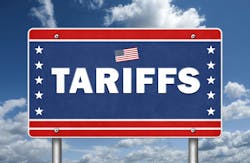U.S. President Donald Trump has stated a clear policy to support U.S. manufacturers and is expected to use existing international trade laws to implement that policy. U.S. manufacturers have the right to petition the government to grant relief under these laws, which can level the playing field by applying broad and/or company and product-specific duties on imports.
Such provisions include antidumping and countervailing duty (AD/CVD) actions against unfairly priced or subsidized imports, Section 232 national security actions, Section 301 actions against unfair foreign trade practices and Section 201 safeguard actions to counter import surges.
With sufficient factual support, U.S. manufacturers—along with other members of the manufacturing industry that request relief under these laws—can expect the application of duties on foreign competitors. (For AD/CVD and Section 201, if a sufficient petition is filed, the agencies are required to investigate.)
We discuss several scenarios below.
Antidumping and Countervailing Duty Investigations
U.S. manufacturers, along with support from other manufacturers in their industry, can petition the International Trade Commission (ITC) and the Department of Commerce (DOC) to initiate investigations on imports of competing, like products. Affirmative determinations result in company and product-specific duties on foreign competitors and goods, which allow U.S. manufacturers to achieve a higher, fair price for their products.
Petitions must demonstrate that either dumping or a countervailable subsidy is occurring with respect to a particular good and that such unfair trade is injuring or threatening to injure the domestic industry.
Under the statute, dumping occurs when a foreign producer sells goods in the U.S. below the sales price in their home market. Dumping disadvantages U.S. companies by unfairly suppressing prices in the U.S. market.
Similarly, countervailable subsidies occur when the government of a foreign country provides their domestic industry with an unfair subsidy or benefit that is specific, such as direct cash payments, credits against taxes, or favorable loans.
After initiation of an investigation, the ITC looks into whether the U.S. manufacturers are injured from the unfairly priced or subsidized imports. The DOC calculates the amount of duties to offset the foreign exporters’ and/or foreign government’s unfair trade behavior. Duties can go into place as quickly as three to six months.
If successful, the duties stay in place for at least five years but often for 15 years or more, and U.S. producers have the right to request the DOC review the unfair pricing and subsidization practices each year after the final affirmative determination.
Section 232 Investigations – Addressing Imports with an Effect on National Security
Section 232 investigations determine the effect of imports on national security. Investigations are managed by the DOC’s Bureau of Industry and Security with input from the Department of Defense and an inter-agency working group based on relevant industry expertise. After an investigation is completed, the DOC makes recommendations to the president on how to address those effects. Petitions under Section 232 are typically brought by an industry group to ensure alignment prior to submission.
During an investigation, the secretary of commerce determines whether imports of the investigated product are entering the U.S. in such quantities or under such circumstances as to threaten or impair U.S. national security. In doing so, the DOC conducts a thorough investigation of the product, industry, uses, imports, and the effect on national security and prepares a report.
If the DOC determines that the imports represent such a threat, the secretary of commerce will advise the President of these findings and offer recommendations to address the national security threat. The DOC has 270 days to present its findings and recommendations to the president, who can concur or not with the secretary's recommendations and take action to adjust the imports or take other non-trade-related actions.
Recommendations from past Section 232 reports have included tariffs, quotas, stockpile expansion, domestic initiatives, multilateral negotiations, suggested legislative action, and use of the Defense Production Act to shore up the investigated industrial base.
Trump initiated eight Section 232 investigations during his first term, of which five resulted in some action, such as tariffs on steel and aluminum imports. In contrast, before Trump’s first term, a president last imposed tariffs or other trade restrictions under Section 232 in 1986, and President Biden only launched one Section 232 investigation.
Section 301 Investigations – Relief From Unfair Trade Practices
U.S. companies can file Section 301 petitions against foreign countries that violate U.S. trade agreements or engage in acts that unjustifiably or unreasonably burden U.S. commerce. The United States Trade Representative (USTR) reviews these petitions to determine whether an investigation is warranted. If warranted, the USTR will investigate the alleged conduct.
If the investigation results in an affirmative finding, Section 301 authorizes the USTR to (1) impose duties or other import restrictions, (2) withdraw or suspend trade agreement concessions, or (3) enter into a binding agreement with the foreign government to either eliminate the conduct in question or compensate the U.S. with satisfactory trade benefits. The retaliatory action will stay in place for at least four years but can remain in place for longer after a review is conducted.
Six Section 301 investigations were initiated during the first Trump administration. The most notable action was the investigation on China’s Acts, Policies and Practices Related to Technology Transfer, Intellectual Property and Innovation. This investigation resulted in the duties against China that went into place in 2018. USTR had an exclusion process for the initial set of duties against China. This action was reviewed and continued by the Biden Administration, where it increased tariffs to up to 100% on certain Chinese imports such as electric vehicles, electric vehicle batteries, battery parts, cranes, solar panel parts and certain critical minerals.
During any Section 301 investigation, the USTR solicits public comments and holds hearings. U.S. companies are encouraged to participate in these requests.
Section 301 actions continue to be a mechanism to address unfair trade practices. For example, the USTR is currently investigating China’s actions in the semiconductor industry and in shipbuilding industry under Section 301.
Section 201 Investigations - Safeguards
U.S. manufacturers, along with others in the industry, can petition the ITC to initiate a Section 201 investigation, or a safeguard investigation. Under this provision, temporary duties and other trade measures can be imposed when a surge in imports is a substantial cause or threat of serious injury to a U.S. industry.
Notably, Section 201 does not require a finding of an unfair trade practice like the other provisions discussed above. The injury requirement, however, is subject to a higher standard. Section 201 requires that the injury or threatened injury be "serious" and that the increased imports must be a "substantial cause" of the serious injury or threat of serious injury. For comparison, imports must only be a cause (and not the only cause) of the injury in AD/CVD cases.
Each trade action discussed above is directed at different activities, but all can result in duties at the border. U.S. manufacturers have standing to file each of these cases when the required facts exist, in order to protect their manufacturing facilities and U.S. jobs from unfair foreign competition.
About the Author

Lee Smith
Leader, International Trade and National Security Practice, Baker Donelson
Lee Smith, leader of Baker Donelson's International Trade and National Security practice, advises clients on matters involving export controls, customs compliance, trade remedy investigations, trade policy, market access, and free trade agreement interpretation. He is based in Washington, D.C.
